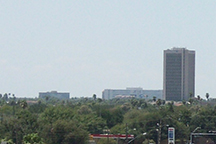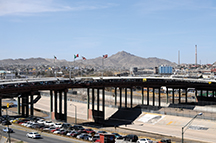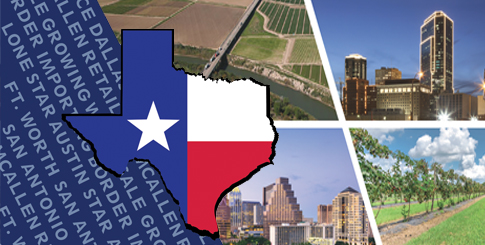Food safety enforcement and regulations have seen a long, bumpy road for most everyone in the food industry, from field to fork. With a number of Food Safety Modernization Act (FSMA) implementations this year, Stachurski believes Texas is “turning the corner” with food safety “finally becoming as important as it needs to be.”
Although some growers are still hesitant to make changes, in part due to cost or because there remains a customer base that’s willing to purchase commodities lacking certain paperwork, Stachurski says, “we’re definitely seeing a shift in the industry.”
Cargil acknowledges the importance of the shift as well, mentioning the impact on many companies’ bottom line: “Food safety is now a full-time job for an employee.”
Stachurski notes, “Everyone in McAllen is very open and receptive to FSMA and regulations, and we’re excited for the growers’ support,” he shares. Dallas Distributing’s Ford is also heartened to see smaller operations getting involved, and asserts that “everyone is pushing it harder every year: retailers, wholesalers, and foodservice are demanding that [food safety certification] information be on file.”
Compliance or Consequences
With the primary concern being health and wellness, it’s hard to argue over food safety regulations. For Greg Russell, managing member for Russell Transport-ation Brokerage, LLC in Austin, it’s pretty simple, straightforward, and goes hand-in-hand with having a thriving business or no business at all.
“If growers are not following guidelines, then people get sick and won’t buy anymore,” insists Russell, citing the 2015 outbreak associated with contaminated cilantro from Mexico.


“Everyone in McAllen is very open and receptive to FSMA..”
Bramel, too, supports the more stringent measures. “I buy my produce from the same people I deliver to,” he says, adding, “I eat at the restaurants they supply, and their families all drive to and shop at the same places I do.” He likes to ask those he works with if they, personally, would buy the product on their trucks.
“The expectation is that things are delivered safely in this country, and sometimes people take it for granted,” Bramel points out. “We need to practice self-governance and policing so any poor practices are dashed against the rocks; everything on the whole supply chain is affected—there are no short cuts.”
Here, There, and Back Again
With the tremendous flow of product passing through Lone Star ports, and robust production in the Rio Grande Valley, transportation is tight. Add in new regulations and high gas prices in Mexico, and these are just a few of the issues plaguing the transportation side of the industry in Texas.
“There are never enough trucks,” declares Russell. This applies pretty much year-round, whether shippers and brokers are dealing with a dearth of trucks in November due to the movement of Christmas trees, or to the summer months when there’s a bumper crop of local produce, higher rates, and still no extra rigs.
Beyond the shortage of both drivers and trucks, like everywhere else in the nation, Texas transportation companies are preparing for new Federal Motor Carrier Safety Administration (FMCSA) regulations, including the requirement to put electronic logging devices (ELDs) in all trucks.
The ELD Saga
Despite multiple attempts by trucking groups and associations to have the ELD mandate overturned, the U.S. Department of Transportation is pushing forward in 2017.
Some truckers are hoping President Trump will weigh in and stop the requirement’s rollout as part of other regulatory freezes, but most do not see this happening. Bottom line, many shipping companies, especially small owner-operators, are bracing for higher costs this year as they install ELDs in trucks. In turn, how much of this cost will be passed on to customers?


Shippers and brokers are dealing with a dearth of trucks and drivers.
“It will definitely have a huge cost impact on all goods, but especially so in produce, as this is a very time- sensitive industry,” points out Russell. “If a truck driver can’t stretch an extra hour or so because of electronic logs, then it will mean teams will have to be used more often, or a trip that was made overnight is now a trip that takes two days.”
Capping Delays at Both Ends
Ibarra equates the challenges with reliability, citing “warehouse operation challenges that prevent the expedited loading of trucks. A big percentage of the shipments that are scheduled to go out one day, end up loading the next day.” Such delays, of course, will have a significant impact on hours of service, tracked to the minute by ELDs.
The answer, as Ibarra sees it, is for both warehouses and the transportation industry to evolve, by streamlining operations. “Delivering product at the final destination, quicker, is the ultimate goal,” he says. He and Marengo Foods have worked hard to uphold their side of the equation through investments in the company’s new facility, to make “our warehouse the quickest unloading and loading place in the valley.”
Bramel agrees, but credits being cautious and selective for his company’s success. “We don’t dispatch trucks unless we know where the products are, so our drivers aren’t burning hours. It takes a little more time for us to make sure orders, especially imports, are in and available for pickup.” He reiterates that “streamlining is our highest priority.”
Changing Landscape = New Opportunities
Although the Rio Grande Valley and other regions in Texas are still major producers of a variety of fruits and vegetables, the shift to growers in Mexico and the expanding influx of imports has created new opportunities throughout the produce industry.
The McAllen region, in particular, has experienced major growth in cold storage, warehouse, and packing facilities, as well as more customs brokerage firms. Tomato Management Corp.’s Blanchard extols the area’s expansion and its impact on business operations: “Wow, how much more produce can you bring into the Texas area?” he asks. “With so many warehouses and suppliers, it’s great for the economy, and a wonderful thing for us and our customers—because we can keep prices down.”
Both Leadbetter and Ibarra mention the rapid rise of cold storage space, in close proximity to the Pharr-Reynosa International Bridge and Pharr port of entry. Marengo Foods’ new facility, finished at the end of last summer, tripled the company’s capacity to handle fruit and vegetable loads. Ibarra says the facility reached about “70 percent capacity during the winter season.”
Trade Issues: Hype or Reality?
As the Texas produce industry continues to march forward, its ports of entry are a key aspect of its growth, with well over 200,000 load equivalent shipments crossing the border each year.
Two Lone Star ports saw phenomenal growth: Laredo at 21.5 percent between 2014 and 2015, and you guessed it, Pharr racking up a 35.5 percent increase for the same period.
A rising number of established and new partnerships, on both sides of the border, are an intrinsic part of the tremendous growth in imports and exports.
Most suppliers in the area praise the port and its potential for the coming years. And while most do not believe the Trump Administration will materially affect trade with Mexico, reconfiguring NAFTA and building a wall against illegal immigration may have an impact.
FRESH FORUM
What do you consider the most critical issue facing the Texas produce industry?Larry Ma, Pacific Plus International, Inc.
If we don’t tax too much from Mexico, because it’s all from Mexico right now; most vendors ship from the border.Gladys Moreno, Dominguez Fresh Produce, LLC
The period from April to June is the hardest for us. We produce a lot of cilantro, so this is a hard time to cross [the border] due to lesser supply.Greg Russell, Russell Transportation Brokerage, LLC
All the regulations put on trucks in California; some are absolutely ridiculous. They’ve killed smaller trucking companies because they can’t afford to go—it’s cheaper to stay in-state and local than to go to California with exorbitant taxes.Tony Stachurski, Hardie’s Fruit & Vegetable Company, LLC
Food safety, 100 percent… We’re passionate about the way we run our business and supportive of food regulation so we can make the food supply in Texas that much safer.Henry Troppy, Jr., La Frontera Cold Storage
There are many things that can happen— the next year will be pretty interesting with the new president. There’s the issue of renegotiating NAFTA, so we’ll see which way it goes… Hopefully, the ag sector is left unharmed.
“This coming year will be interesting,” says Henry Troppy, Jr., general manager for La Frontera Cold Storage in Progreso Lakes. “The Mexico deal is 100 percent of my business; I want things to be good down there; I want them making money and shipping produce. I grew up farming on this side of the border, but the business I am in now is tied to the other side. It’s a key year—it will give us an idea of what the next four or eight will be like.”
For Troppy, everything associated with growing and shipping produce in Mexico is of interest. The recent deregulation of Pemex, the government-owned and operated gas and diesel company, had a significant impact. “Fuel costs went through the roof, so the cost of freight dramatically changed,” he contends. “When prices go up 20, 30, even 40 percent overnight, there’s a ripple effect that hits everybody.”
Regardless of politics or the diesel pricing surge, Ibarra believes the Pharr crossing is on its way to being “a first-class entry port. It has taken a great deal of effort,” he concedes, “but local trends are falling into place.”
Ibarra is also enthusiastic about customers shifting loads from Nogales to McAllen, which he credits in part to the Texas International Produce Association and redoubled efforts to promote the McAllen region and its “port of entry as a better option for produce shipped to the Midwest, or East, which was traditionally coming from the West.”
Resilient and Ready
All in all, Texas is booming, whether you buy, sell, pack, ship, or store fresh produce. Those on the growing side remain vital to demand for homegrown fruits and vegetables, both within the Lone Star State and outside it; while those who trade with Mexico and other countries have forged solid partnerships to maintain a stable, affordable fresh food supply for North American consumers.
“We’re holding our own, in our niche of the world,” shares Dallas Direct’s Ford. “Things may be changing, but we keep cruising along.”
Leadbetter of Majestic Produce also believes resiliency is a key to long-term survival and success. A major concern, he emphasizes, is a “lack of preparedness—if you’re not ready to revamp and rethink what you’re doing, then you’re in trouble. We’re sticking with what we have, but if anything changes, we have irons in the fire so we can switch gears.”
In addition, he notes, “As far as Texas goes, the next 20 years will decrease what’s grown here because so much comes from Mexico.” Grower-shippers and distributors, Leadbetter cautions, should be ready to “switch gears—we might eventually be strictly an importer, but we don’t want to because we still see demand for American product.”
While no one knows what the future will bring, few doubt the tenacity or resiliency of Texas suppliers to adapt and thrive. And this is but one of the attributes that makes the Lone Star State so appealing and at the top of the produce game.
Images: Joel Pacheco, Valleyite12, David Litman, Laura Gunn, Sean Pavone, f11photo, Philip Lange, photo.ua,
Sean Pavone, David Litman/Shuterstock.com



